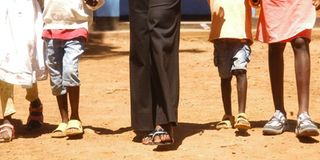‘I am in pain’, cries Samburu FGM victim

As effects of the Covid-19 pandemic take a heavy toll on Kenyans, girls in Samburu County are facing a difficult time as they are subjected to Female genital Mutilation (FGM) at their homes.
Naserian, (not her real name) recently revealed that her parents forced her to undergo the cut after they secretly received her bride price.
“I was doing my homework when one early morning I was ambushed by five women who forced me to undergo the cut,” says the 14-year-old.
Her attempt to escape was futile as she was confined and isolated before being married off.
Jane (not her real name) says her efforts to seek medical attention have not been successful because of lack of money.
“I am in pain and every time I speak about it I am silenced with ‘there is no money’ excuse,” she says.
The Samburu community believes that girls must be circumcised to prepare them for marriage, failure to which they are still viewed as girls and not women.
Uncircumcised girls are referred to as ‘ntoiyie nemomurata’. The title is usually associated with stigma and disgrace.
Human rights activists in Samburu have expressed fear that the number of girls being subjected to FGM is on the rise in the wake of the Covid-19 pandemic.
New tricks, lack of sensitisation forums and the closure of rescue centres due to coronavirus threat have exposed more girls to the cut.
Administrative officials in the region say communities are taking advantage of schools closure to take underage girls for the cut before marrying them off.
The stay-at-home and social distancing orders to curb the spread of the virus has fueled continuity of the outlawed practice as families seek to marry off their daughters to cushion themselves form the hard economic times.
Samburu County Director for Gender and Social Services Letipila Nasiaku says the pandemic has disrupted sensitisation programs.
"We are still getting reports of increased cases of FGM in the villages. Initially, our sensitisation forums helped reduce these cases but we cannot do them now due to coronavirus. Now they are taking advantage of this period to subject girls to the cut," says Ms Nasiaku.
She notes that anti-FGM activists and security authorities have resolved to use local vernacular media stations to reach out to residents in remote areas.
"Girls are vulnerable now because schools are closed and they are stuck at home," she adds.
Samburu Girls Foundation estimates that tens of girls across Samburu have been secretly subjected to the outlawed practice since March, when the first case of coronavirus was reported in the country.
Executive Director Josephine Kulea says the girls are being married off secretly and the pandemic is frustrating efforts to rescue them.
Dr Kulea says with mass graduations of Samburu morans, the number of girls likely to be subjected to early marriages is set to rise sharply in the coming weeks.
"Those who are secretly cut are being prepared and are often married off forcibly. We are worried because morans are graduating this season," says Dr Kulea.
According to United Nations, one in five women and girls between 15 and 49 in Kenya have undergone the cut resulting into serious health complications.
Kenya criminalised FGM in 2011 with a punishment of up to three years’ imprisonment for perpetrators.
Samburu is one of Kenya’s FGM hot spots. Other counties with FGM prevalence include Isiolo, Migori, Kisii and Kajiado.





